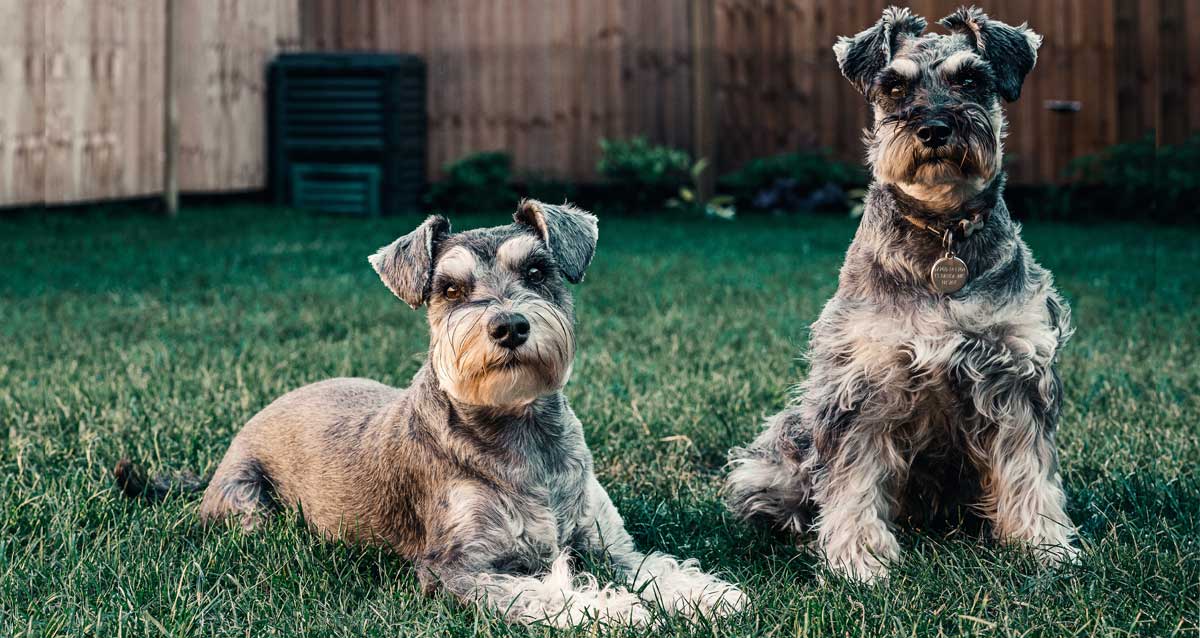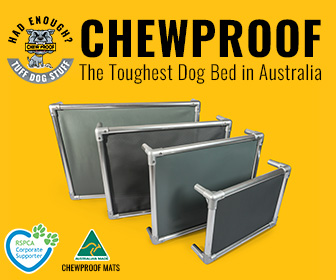Schnauzer Info & Schnauzer Breeders
The Schnauzer is the original sheepdog of the Austrian Tyrol (Alps) and not German, as is generally thought. The name schnauzer came from the German word for "moustache", because of the breed's distinctively bearded snout. The schnauzer type consists of three breeds: The Miniature, Standard and Giant. Schnauzers were originally developed as a ratter, also for droving and herding, with watchdog capabilities. Although the Schnauzer is considered a terrier-type dog, they do not have the typical terrier temperament.
Schnauzer temperament
Schnauzers have a wonderful temperament. They are loyal, devoted, and quick to defend family. Schnauzers are high-spirited, intelligent dogs, that desperately want to please the ones they love. They need plenty of exercise and playtime and are great with children if raised and socialized properly. In games, schnauzers can play as rough, or gentle as you like, depending on who the playmate is. Schnauzers were originally bred as guard dogs, but are not aggressive by nature.
The Standard Schnauzer can be mischievous, bold, and fun-loving. The miniature can be a bit more affectionate, alert, and spunky. A Schnauzer will bark at strangers initially but will relax once a friendship is established. As with many small breeds, the miniature schnauzers can have a tendency to bark more. The giant and standards are described as being rambunctious and quite bold.
Skip to Registered Schnauzer Breeder list >
The ideal owner for a Schnauzer
All three Schnauzer breeds are loyal and devoted dogs that deserve the same in return from their family/carer. They will require someone who can provide training and regular exercise, and in general would suit most situations - singles, couples, or families.
Training and socialisation
The Schnauzers' intelligence makes them great to train. They will require a gentle and consistent training method. Variety and fun games should be provided to avoid a tendency towards stubbornness during training. Early and thorough socialisation is important for all three breeds, which will ensure that they are used to, and will get along well with children. They can also get along with cats and other pets if trained and socialised properly.
How much space and exercise do Schnauzers need?
Schnauzers thrive on daily exercise, and games to keep their active minds challenged and entertained. A small to medium backyard size is suitable for standard and miniature schnauzers, and apartment living is fine as long as they get sufficient exercise. A good size yard is important for the giant schnauzers. Schnauzers love to be with their family, so access to both indoors and outdoors is the ideal situation for them. Schnauzers are often referred to as “the dog with the human brain”, meaning that they love to interact with people. Chained, or kennelled, in the back yard, or left for long periods is not good for this breed.
Schnauzers & Grooming
Schnauzers have a wiry coat that sheds very little. The coat is medium in length, although giant schnauzers can have a short coat. Regular stripping and trimming, or visits to a professional groomer is recommended to keep the coat healthy. Some breeders suggest stripping instead of clipping the fur as clipping makes the coat soft and more prone to matting.
Schnauzer colour variations
- Pepper and salt – shades range from dark iron grey to light grey. Hairs banded dark/light/dark. Dark facial mask to harmonise with corresponding coat colour.
- Pure Black.
- Black and silver – solid black with silver markings on eyebrows, muzzle, chest, brisket, forelegs below point of elbow, inside of hindlegs below stifle joint, vent and under tail.
- White.
Also see ANKC breeder list for Miniature Schnauzers and Giant Schnauzers
- Pepper and salt – shades range from dark iron grey to light grey. Hairs banded dark/light/dark. Dark facial mask to harmonise with corresponding coat colour.
- Pure Black.
- Black and silver – solid black with silver markings on eyebrows, muzzle, chest, brisket, forelegs below point of elbow, inside of hindlegs below stifle joint, vent and under tail.
- White.
Potential health issues in Schnauzers
Schnauzers are generally very healthy dogs but as with every breed, there are a few health issues that may occur. Responsible breeders will ensure that all appropriate testing is done prior to breeding and will be happy to answer questions you may have around potential health problems.
Follicular Dermatitis: Follicular dermatitis is an irritation of hair follicles (like eczema) that creates itchy bumps. The condition can be treated with medicated shampoo provided by your vet and regular grooming. This can occur in all three Schnauzer breeds.
Progressive Retinal atrophy (PRA) : PRA is an inherited condition and the most significant of the genetic health issues that can occur in Miniature Schnauzers. It causes the deterioration of the retina in the eye and cannot be treated. Dogs who are affected will eventually go blind. In most cases, there are no signs until 1-2 years of age. Research in the United Kingdom has identified a new mutation causing Progressive Retinal Atrophy (PRA) in Giant Schnauzers, which is being referred to as PRA5 to distinguish it from other genetic forms of PRA that occur in other breeds.
Cataracts can also affect Minis and Giant Schnauzers. Both hereditary and congenital hereditary forms affect the Minis, and it is strongly recommended that all Miniature Schnauzers are eye-tested annually. Giant Schnauzers should have eye testing for Hereditary Cataracts.
When looking for a puppy, any caring and responsible breeder will be able to show you Eye Test Certificates of the mother and confirm that the sire has a clear certificate (both should dated within the previous 12 months). You would also be given a copy of the Litter Screening Form to prove that the litter is clear of eye problems when you purchase the puppy.
Some schnauzer clubs require that the breeding dogs of all members have been eye tested and cleared prior to breeding.
Pancreatitis : Minature Schnauzers are predisposed to pancreatitis. According to UFAW the lifetime risk of developing the disease is around 5%. Aside from a genetic predisposition, it can develop due to excess weight, and in some cases can be a side effect of surgery. A healthy diet is important to avoid pancreatitis, with fatty foods and human foods avoided. The most common signs of pancreatitis include loss of appetite, hunched back, vomiting, and diarrhoea. Other symptoms may include weakness, depression, and fever. Mild cases can be treated, but the condition can cause severe pain, and extreme cases can lead to death.
Portosystemic Shunt (PSS) : PSS (or liver shunt) is caused by blood not flowing through the liver, preventing it from developing and performing properly. Symptoms can be mild - lethargy, excessive drinking and urinating or severe - seizures, disorientation and confusion. Signs of this disorder usually appear by 6 months, and nearly always by 2 years of age. Seek veterinary advice if your pup has any of these symptoms. While treatment is available, it can be fatal. See liver shunt in miniature schnauzers for more detailed information.
Bladder or Kidney Stones : Miniature Schnauzers can be prone to this health issue. Symptoms could be a change in urine (increase, decrease or blood), abdominal discomfort, lethargy, or poor appetite. Surgery may be needed to treat this condition.
Hip Dysplasia: Hip Dysplasia is a deformity where the femur head doesn't fit properly into the hip socket. It is commonly found in larger breeds and can occur in standard and giant schnauzers. It is generally considered a genetic trait, but can also be caused by environmental factors (excess weight, inappropriate exercise, stairs, slippery floors).
Gastric Dilation-Volvulus (GDV): Most deep-chested breeds can suffer from GDV (or bloat) which may affect Giant Schnauzers. Bloat occurs when a dog's stomach is stretched by gas or food, the distended stomach rotates, trapping the gas and blocking off the stomach's blood supply. Symptoms to look out for are an enlarged abdomen, retching, restlessness, salivation, and pain/whining if you press on their belly.
General facts about Schnauzers:
Miniature Schnauzers:
Average life expectancy: 12-15 years
Average weight: Females: 4.5-6.8 kg, Males: 5-8 kg
Average height (at withers): Females: 28-36 cm, Males: 28-36 cm
Standard Schnauzers
Average life expectancy: 13-16 years
Average weight: Females: 14-20 kg, Males: 16-26 kg
Average height (at withers): Females: 43-48 cm, Males: 46-51 cm
Giant Schnauzers
Average life expectancy: 10-12 years
Average weight: Females: 25-34 kg, Males: 27-48 kg
Average height (at withers): Females: 60-65 cm Males: 65-70 cm
Schnauzer History
It is believed that the breed originated sometime before the 14th century and it is generally accepted that the beginning of the breed we know today as the Schnauzer is the result of a cross between the Wolf Spitz and Wire Haired Pinscher, and possibly the Black German Poodle. From the original “standard size” the Miniature and Giant Schnauzers were developed. The Miniature was bred in the 19th century after crossing with breeds like the Miniature Pinscher and Affenpinscher, and the Giant by crossing the larger Standard Schnauzers with the Great Dane and possibly the Bouvier Des Flanders or with large coarse coated dogs known as Bavarian Wolfhounds.
Schnauzer FAQs
1. Are Schnauzers affectionate?
2. Are Schnauzers good family dogs?
3. Are Schnauzers aggressive?
4. Are Schnauzers good guard dogs?
5. Are Schnauzers smart?
6. Are Schnauzers non-shedding?
Fun facts about Schnauzers
References:
Schnauzer Club of Victoria - Schnauzer History
Schnauzer Club UK - Schnauzer Health
If you are a small scale ANKC registered breeder and would like to be listed here, just contact us or follow a few simple steps to add your details yourself.
We welcome helpful comments and contributions to information about this breed by email or below...
Registered Schnauzer Breeders
The prefix Koobalies (which is Aboriginal for children) was ... read more











.jpg)
.jpg)
.jpg)